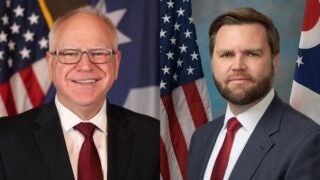USC experts discuss the fate of democracy in a post-truth America
 Greetings and Happy New Year from USC Media Relations. This week, the state of democracy in the U.S. is top of mind for Americans as chaos ensues in the still speaker-less House and the anniversary of the Jan. 6th attack on the Capitol draws near.
Greetings and Happy New Year from USC Media Relations. This week, the state of democracy in the U.S. is top of mind for Americans as chaos ensues in the still speaker-less House and the anniversary of the Jan. 6th attack on the Capitol draws near.
Experts at USC are available to discuss the ongoing threats to American democracy, including the mis/disinformation that drives much of today’s social and political divide, and where we go from here.
Contact: raffio@usc.edu or uscnews@usc.edu
Political polarization isn’t new, but it is getting worse
 “Social division has always existed in America. But today’s political polarization is worse than anything our nation has experienced. From social media to search algorithms to gerrymandering to our own self sorting, America has become dangerously divided.
“Social division has always existed in America. But today’s political polarization is worse than anything our nation has experienced. From social media to search algorithms to gerrymandering to our own self sorting, America has become dangerously divided.
“Having studied the origins, extent and solutions to polarization, I am intensely motivated to help people and organizations understand what should be done to make disagreement healthy instead of toxic and thus strengthen interpersonal relationships and democracy in general.”
Kamy Akhavan, former CEO of ProCon.org, the nation’s leading source of nonpartisan research on controversial issues, leads the Center for the Political Future at USC Dornsife College of Letters, Arts and Sciences.
Contact: kakhavan@usc.edu
Who’s to blame for the spread of misinformation? Experts point to social media platforms, not individual users
 Wendy Wood, provost professor of psychology and business at the USC Dornsife College of Letters, Arts and Sciences illustrates the role of social media in perpetuating falsehoods. She argues that platforms must undergo major structural changes to effectively combat the habitual spread of misinformation.
Wendy Wood, provost professor of psychology and business at the USC Dornsife College of Letters, Arts and Sciences illustrates the role of social media in perpetuating falsehoods. She argues that platforms must undergo major structural changes to effectively combat the habitual spread of misinformation.
“Because social media sites were originally created for interaction among college students, there’s a sort of popularity mechanism that hasn’t translated well into its current use of sharing news. People are rewarded for sharing things that are sensational.
“The problem is structured into social media. And that creates habits that lead to indiscriminate sharing of all information, regardless of how truthful it is. It’s not really a problem with individual users. It’s more a function of the structure of the social media sites themselves.”
Wood’s research addresses how we form and change our habits, along with the ways we explain habitual behaviors. Her most recent work explores voter behavior and barriers that impact voter turnout.
Contact: wendy.wood@usc.edu
No one wins in the war on truth: How misinformation represents an existential threat to society
 “Misinformation is not just a national security threat, and combating misinformation is not just a moral imperative. Misinformation is an existential threat. Allowing the line between truth and falsehood to erode will make us a cynical society.”
“Misinformation is not just a national security threat, and combating misinformation is not just a moral imperative. Misinformation is an existential threat. Allowing the line between truth and falsehood to erode will make us a cynical society.”
An expert in deepfake and image manipulation detection, Wael Abd-Almageed serves as a research associate professor of electrical and computer engineering at the USC Viterbi School of Engineering, and as a research director at the USC Information Sciences Institute. Other research interests include debiasing and fair representations, multimedia forensics, and face recognition and biometric anti-spoofing.
Contact: wamageed@isi.edu
Why safeguarding the future of democracy requires confronting the past
 Hajar Yazdiha, an assistant professor of sociology at the USC Dornsife College of Letters, Arts and Sciences argues that we can’t make sense of our contemporary crises of democracy without understanding our collective past.
Hajar Yazdiha, an assistant professor of sociology at the USC Dornsife College of Letters, Arts and Sciences argues that we can’t make sense of our contemporary crises of democracy without understanding our collective past.
“The revisionist memories of the racial past are the scaffolding for alt-realities where white conservatives are the victims of multicultural democracy, where Black and Brown people pose existential threats to a ‘true America,’ and where violence can be legitimized under the banner of reclamation as we saw in the Jan. 6 insurrection at the Capitol. In this alt-reality, disinformation is a powerful weapon for mobilizing the masses, whether to the polls or to the streets.
“The rollback of democracy has been enabled through a revisionist history that willfully evades the ongoing reality of systemic inequality in the United States. This alt-history paints a rosy picture of racism that ended in the 1960s thanks to American exceptionalism. By obscuring the roots of our contemporary social crises, this willful historical amnesia threatens and erodes American democracy and our capacity to work collectively to save it.”
Yazdiha is an expert in race and ethnicity, migration, social movements, culture and law. Her latest book, entitled “The Struggle for the People’s King: How Politics Transforms the Memory of the Civil Rights Movement,” will be published in May 2023.
Contact: hyazdiha@usc.edu
(Photo/iStock)



